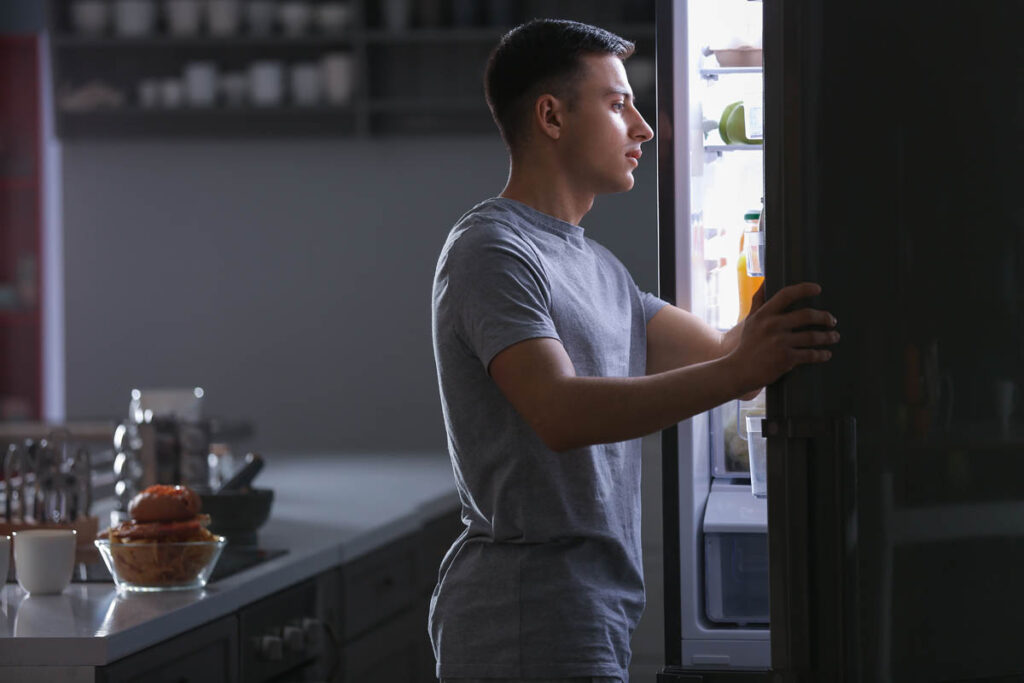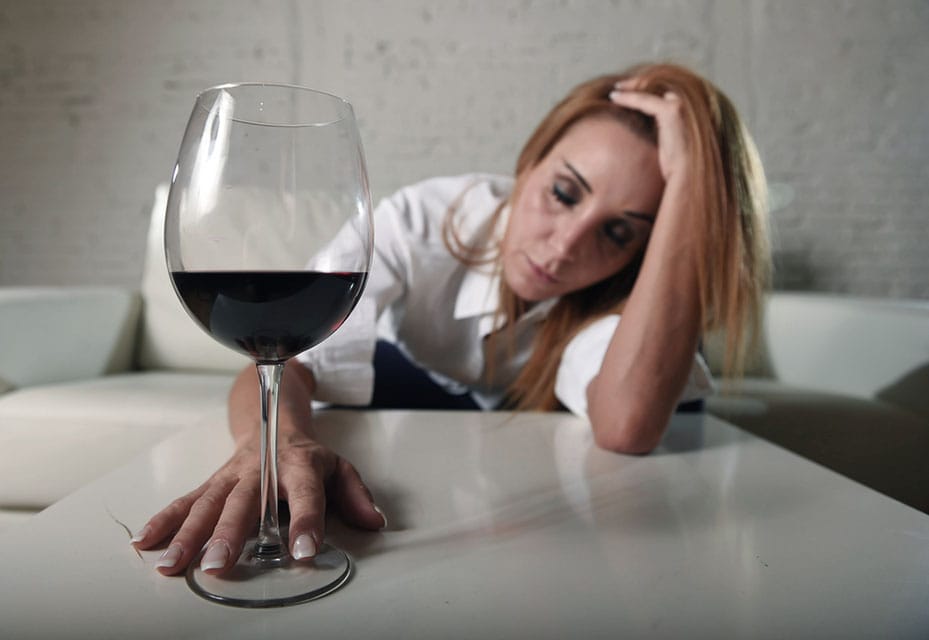Drunk eating is something many people brush off as harmless or even humorous. But for some, it can signal a deeper struggle with impulse control, emotional regulation, or self-soothing behaviors. Combined with binge eating patterns, it can lead to cycles of shame, regret, and physical discomfort that disrupt both physical health and emotional well-being.
The Ranch Tennessee takes a compassionate and comprehensive approach to helping clients explore the roots of these behaviors. Whether you’re trying to understand your own relationship with food and alcohol or supporting someone who is, this guide breaks down the connection between alcohol and binge eating, and how to begin changing those patterns for good.
Understanding binge eating and its connection to alcohol
Binge eating is more than simply overeating. It typically involves consuming large amounts of food in a short period of time, often accompanied by feelings of loss of control, guilt, or distress. These episodes may be triggered by emotional overwhelm, unmet needs, or physical imbalances, but substances like alcohol can also influence them.
Alcohol affects both decision-making and appetite. When drinking, inhibitions are lowered, cravings intensify, and it becomes harder to recognize fullness cues. This creates a perfect storm for impulsive or compulsive eating. Over time, these habits can become deeply ingrained, especially if eating has become a go-to coping mechanism during or after drinking.
Why does drunk eating happen?
The link between alcohol and eating behaviors is rooted in both biology and behavior. Some of the most common reasons people eat more when drinking include:
- Impaired judgment: Alcohol disrupts the brain’s ability to weigh consequences and make mindful choices.
- Increased appetite: Drinking can spike hunger hormones and lower the body’s ability to feel full.
- Emotional avoidance: Alcohol and food can both be used to suppress uncomfortable emotions.
- Habit formation: If eating after drinking becomes routine, the body and brain begin to associate alcohol with food intake.
- Social cues: Late-night takeout runs, drinking events with food, and peer behavior can all normalize excessive eating while intoxicated.
The good news? These patterns can be changed. Understanding how to stop drunk eating begins with self-awareness and support.
How drunk eating contributes to emotional and physical strain
While the occasional snack after a night out isn’t cause for concern, frequent or extreme episodes of drunk eating can take a toll. Physically, it can contribute to digestive issues, poor sleep, weight fluctuation, and fatigue. Emotionally, it can lead to shame, self-judgment, and strained self-esteem.
Over time, these cycles may mimic or worsen disordered eating patterns, especially when combined with emotional stress, trauma, or substance use.
That’s why addressing both the eating behavior and the underlying emotional triggers is key to lasting change. If this is a recurring issue for you or someone you care about, know that binge eating solutions do exist, and they don’t rely on shame or willpower alone.
Binge eating solutions that address the full picture
At The Ranch, we approach binge eating with curiosity, compassion, and proven therapeutic methods. That includes:
- Identifying emotional and physical triggers for both drinking and eating behaviors
- Exploring the role of impulsivity, trauma, or past emotional pain
- Developing healthier coping tools for stress, sadness, or loneliness
- Creating structure and predictability around meals and drinking behaviors
- Practicing mindfulness and body-awareness exercises
These binge eating solutions are not about rigid rules or quick fixes. They’re about building a sustainable, respectful relationship with food, body, and emotions.
Learn more about our approach to binge eating solutions.
How to stop drunk eating: practical tips
If you’re looking for strategies on how to stop drunk eating, these steps can help build awareness and set you up for more mindful choices:
- Eat before drinking: Starting the night with a balanced meal reduces alcohol’s effects and helps prevent extreme hunger later.
- Stay hydrated: Drinking water between alcoholic beverages can help regulate appetite and reduce the desire to snack impulsively.
- Pause before eating: If you feel the urge to eat, take a moment to ask yourself if you’re physically hungry or emotionally seeking comfort.
- Limit access: If late-night food runs or delivery apps are part of the pattern, consider removing easy access after a certain hour.
- Set intentions: Remind yourself before drinking that you’re working to change the pattern, and have a few go-to coping tools ready (like journaling, stretching, or calling a friend).
- Reflect with kindness: If you do eat while drinking, avoid shaming yourself. Use it as an opportunity to learn what contributed to the decision.
These steps are just the beginning. Professional support can make a meaningful difference for deeper transformation, especially if drunk eating is part of a larger cycle.
Explore our guide on how to stop drunk eating for more support.
Personalized care for overcoming drunk eating habits
At The Ranch, we understand that food and alcohol are rarely just about food or alcohol. They’re often connected to identity, trauma, relationships, and emotional survival. That’s why our treatment programs go beyond symptom management. We help clients build insight, develop resilience, and reconnect with their sense of self.
Our approach to overcoming drunk eating habits includes:
- Individual counseling to explore the emotional roots of binge eating
- Trauma-informed therapy for those with a history of emotional or physical pain
- DBT and CBT to strengthen emotional regulation and thought awareness
- Mindfulness-based strategies for tuning into the body’s cues
- Group therapy for shared understanding and encouragement
- Holistic modalities like equine therapy, adventure therapy, and expressive arts
We create personalized care plans that honor each client’s history, challenges, and goals, without shame or judgment.
Alcohol abuse and its connection to binge eating
For many people, drunk eating isn’t just about late-night cravings or poor decision-making. It can be part of a larger pattern tied to alcohol abuse, emotional dysregulation, and unresolved trauma. When alcohol use becomes frequent or compulsive, it often coexists with disordered eating patterns, especially binge eating.
Alcohol affects the brain’s reward system in ways that are similar to food. Both can be used to escape discomfort, soothe emotional pain, or fill a perceived void. Over time, the combination of drinking and binge eating can become a deeply ingrained behavior loop, one that’s hard to break without support.
Some warning signs that alcohol and binge eating may be connected include:
- Feeling out of control while drinking and eating
- Using food or alcohol to numb shame, anger, or sadness
- Repeating cycles of overdrinking and overeating despite regret
- Isolating or hiding behaviors from others
- Struggling to stop even when you want to
At The Ranch Tennessee, we understand how intertwined these issues can become. Our alcohol addiction treatment programs are designed to treat the whole person, not just the substance use. That means helping clients explore the emotional drivers behind their behaviors while providing tools for regulation, awareness, and long-term healing.
Clients in our programs benefit from:
- Medically supervised detox when needed
- Individual and group therapy that addresses both alcohol use and eating patterns
- Trauma-informed care for those with co-occurring emotional wounds
- Skill-building through CBT, DBT, and mindfulness practices
- Peer support and ongoing accountability
Treating alcohol use and binge eating together leads to deeper, more sustainable recovery. It also helps clients reclaim their relationship with food, their bodies, and themselves.
FAQs
What are some effective strategies to stop drunk eating?
Strategies include eating balanced meals before drinking, staying hydrated, practicing mindfulness when urges arise, limiting access to impulsive food choices, and setting clear intentions ahead of time. Long-term success often involves therapy and self-awareness work.
How can binge eating habits be overcome?
Binge eating habits can be overcome by identifying emotional triggers, developing alternative coping skills, and addressing deeper emotional or behavioral patterns through therapy, support groups, and structured treatment programs.
What personalized support options are available for those struggling with drunk eating?
At The Ranch, personalized support includes one-on-one therapy, group sessions, trauma-informed care, nutritional guidance, and holistic therapies. Each client receives a tailored plan to support their relationship with food, alcohol, and emotional well-being.
Why do people tend to eat more when they are drunk?
Alcohol lowers inhibitions, impairs judgment, and increases appetite hormones. It also disrupts cues for fullness, making it easier to overeat without realizing it. Emotional and social habits formed around drinking can also contribute to the behavior.
What are the long-term effects of frequent drunk eating?
Long-term effects may include weight fluctuation, digestive issues, poor sleep, emotional distress, and the development or worsening of disordered eating patterns. Over time, it can also impact self-esteem and increase the risk of other impulsive behaviors.
Begin your healing journey at The Ranch
If you’re tired of repeating patterns with food and alcohol, and unsure how to stop, there’s no need to navigate it alone. At The Ranch Tennessee, we offer holistic, trauma-informed care to help clients explore the “why” behind their behaviors and build a new path forward.
Whether you’re looking for emotional support, personalized therapy, or long-term recovery care, our team is here to help.
Call us at 888.483.7718 or visit our website to learn more about our approach.


